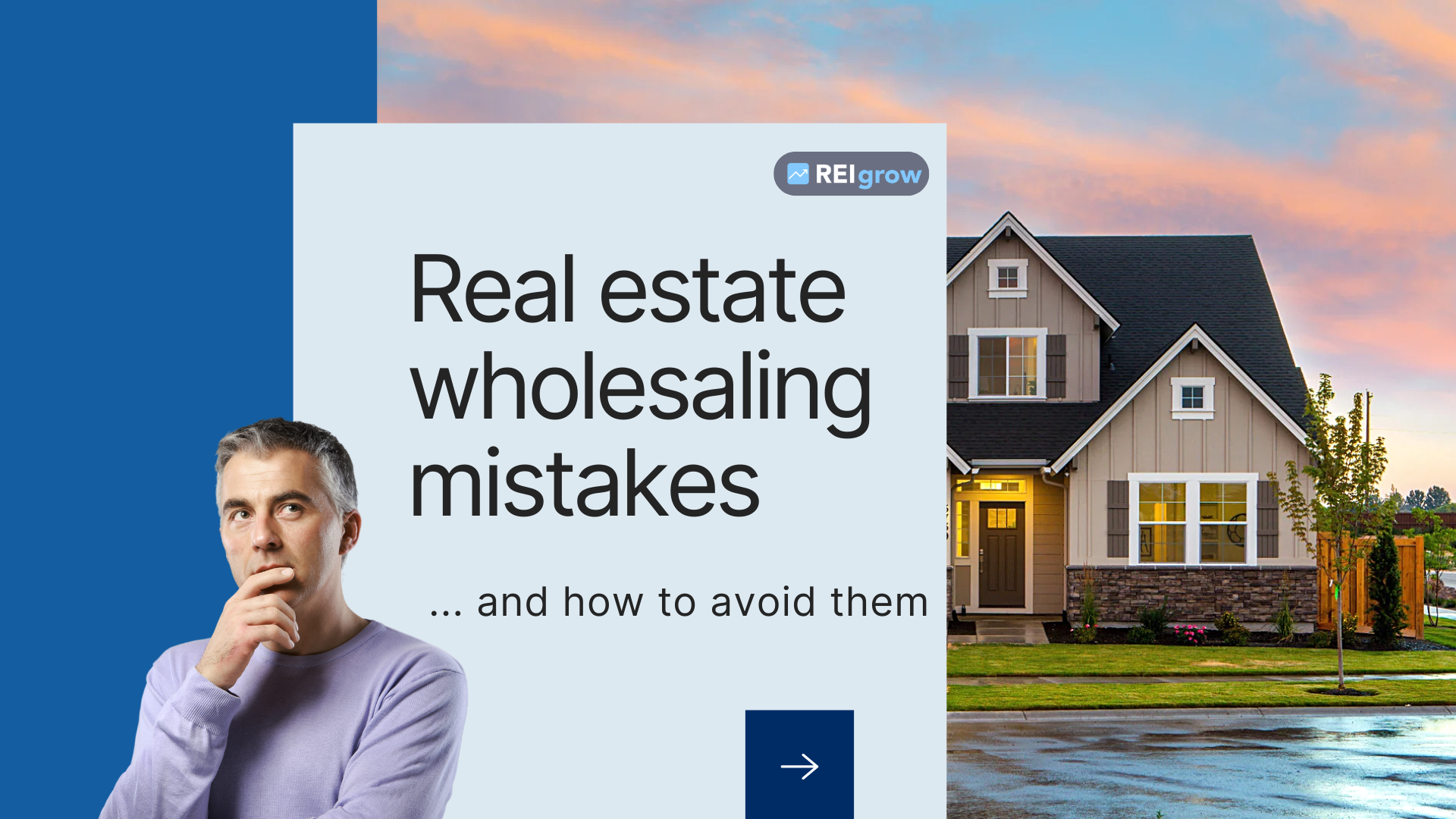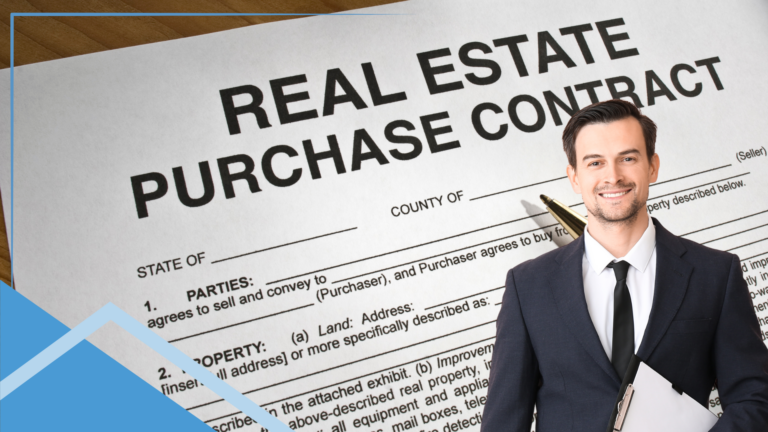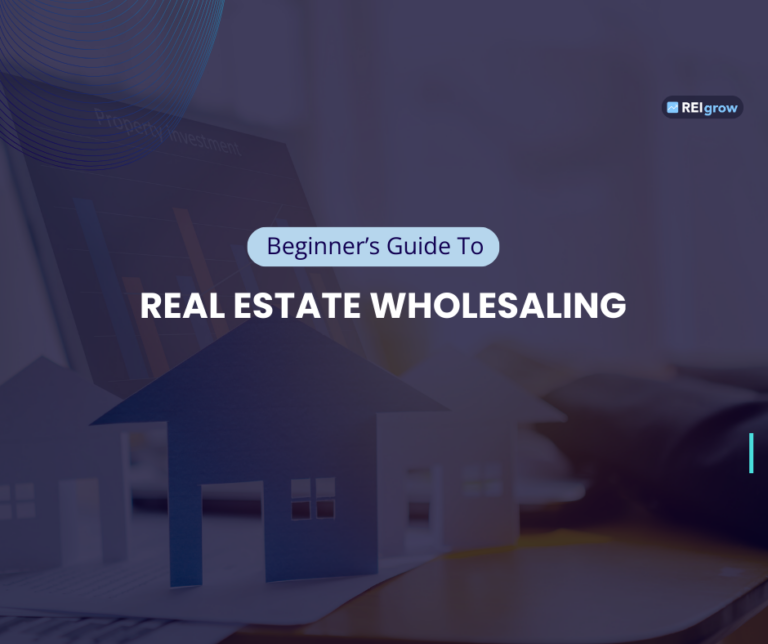Top 11 Real Estate Wholesaling Mistakes New Investors Make
Wholesaling may appear pretty straightforward on the surface: find a distressed property, secure it under contract at a discount, and then assign the contract to a rehabber or investor for a fee.
This real estate investing strategy often requires minimal capital. The low barrier to entry makes it an ideal starting point for new investors.
Thus, the basic premise of a real estate wholesale deal is simple. But, the devil lies in the details.
A new investor’s path to success in real estate wholesaling is paved with potential pitfalls.
Understanding what these mistakes are and how to avoid them, can make the difference between a thriving real estate wholesaling business and a venture that fizzles out within the first year.
In continuation to our in-depth guide to real estate wholesaling, let us now look at the 11 most frequent mistakes new real estate wholesalers tend to make:
1. Conducting Wholesaling Activity on Own Name
Wholesaling involves acting as a middleman between sellers and buyers, and if you operate under your name, your personal assets could be in jeopardy if any disputes arise. So, wholesalers should always set up a separate legal entity.
Having a separate entity also makes your business look more professional. It will help you gain the trust of potential sellers and cash buyers.
With a legal entity, you can also plan your taxes better and organize your real estate investment business for growth.
This separation of your wholesaling activities from your personal identity (and finances) shows that you take your business seriously.
2. Neglecting Due Diligence at the Time of Getting a Property Under Contract
Due diligence means thoroughly checking the property, understanding its condition, worth, and any legal issues that could impact the deal.
Skip this step and you might have to deal with unpleasant surprises later, like hidden damages, title hiccups, or zoning problems that could ruin the agreement or cause financial harm.
Therefore, real estate investors should investigate the property thoroughly before committing to a contract.
3. Overestimating ARV (After Repair Value) and Contracting the Property at a High Price
When you overestimate a property’s worth after repairs, you might end up paying too much when buying it. If you pay too much based on a high ARV, your profits in a real estate wholesale deal could take a hit.
So, investors should do their homework, check out similar properties, and accurately estimate repair costs to avoid this pitfall.
Paying a steep price for a property because of an inflated ARV can also make it tough to sell to other investors at a price that works for everyone. This could leave you stuck with a property for a while, tying up your money and cutting into your profits.
So, double-check your ARV figures to make sure they match the current market trends for successful wholesale transactions.
4. Advertising a Property Not Under Contract
Advertising a property without a contract in place can lead to misunderstandings and harm your standing in the market.
Potential buyers might lose trust in your REI brand if they find out the property you advertised isn’t available for purchase. Failure to secure the property as promised can also result in legal issues.
So, be honest with potential buyers and clearly state that the property isn’t currently under contract.
5. Forgetting the Disclaimers and Legal Guidelines
Wholesaling is legal in all 50 states but you need to follow the laws that govern real estate wholesale transactions in your state to protect yourself and your clients.
Not including the necessary disclaimers in your real estate wholesale contracts or marketing materials could lead to lawsuits and fines.
In the absence of clear disclaimers explaining the transaction details and potential risks, you might unintentionally mislead buyers or sellers.
Here’s what real estate wholesalers can do:
- Be Transparent: Always let sellers and buyers know that you’re a wholesaler to avoid any confusion.
- Know the Law: Stay up-to-date on local real estate regulations to make sure you’re operating within the law.
- Get Expert Help: Consider working with real estate attorneys to handle any legal issues that may come up.
- Put It in Writing: Document all your agreements using standard contracts to keep everything official.
6. Giving Your Earnest Money to Seller Directly
Do not hand your earnest money directly to the seller.
While it might seem like a shortcut to seal a deal, this approach can expose you to scams or dishonest sellers.
This practice can lead to potential complications and loss of control over the transaction.
Earnest money acts as a deposit to show your commitment to purchasing the property.
Usually, it’s best held in escrow by a neutral third party like a title company or real estate attorney to ensure impartial handling of funds.
7. Not Verifying a Buyer’s Funding Source
Always verify a buyer’s financial capacity or funding source. This step is crucial to avoid disruptions in real estate wholesale deals due to a lack of funds.
You can imagine the frustration of finding out that your buyer can’t close the real estate wholesale deal because they’re short on cash.
Verifying their financial capacity upfront saves you time and headaches. It also helps you build trust, avoid legal entanglements, and guard against fraud.
8. Lack of a Reliable Buyers List
Many new investors overlook the importance of having a robust list of buyers, ready to capitalize on real estate wholesale contracts.
In the absence of a reliable buyers list, you will find it challenging to wholesale real estate deals in any market. This can result in increased holding costs and lower profits.
When experienced wholesalers secure a property under contract, they reach out to their pool of potential buyers immediately to close the deal as soon as possible.
So, they keep building on their lists of potential cash buyers, house-flippers, and buy-and-hold investors in their markets.
This network can also offer valuable insights into market trends and buyer preferences; they can help you align your acquisitions with their demands.
9. Not Having a Real Estate Wholesaling Website
Still don’t have a real estate wholesaling website?
You might be missing out on a valuable tool to attract motivated sellers looking to offload distressed properties and buyers keen to purchase wholesale contracts for house flipping and other real estate investments.
A website can boost your online presence and credibility in the market. It provides a platform to promote your brand, share client testimonials (social proof), and showcase your expertise in real estate wholesaling.
You can capture motivated seller leads through local real estate investor SEO, PPC ad campaigns, social media marketing, etc, and present contracted properties with photos, descriptions, and virtual tours to offer a more engaging experience for potential buyers.
10. Not Using a Real Estate CRM and Marketing Automation
Savvy investors use CRMs for real estate wholesaling like REI Grow to:
- Source, manage, and nurture motivated seller leads
- Automate follow-ups to leads and other contacts, including potential buyers
- Analyze data from a single dashboard to make smart decisions
With a real estate investor CRM, you can keep your contacts organized, track interactions, and set automated reminders (integrated with your calendar) to ensure you never miss out on important appointments and potential deals.
When you automate real estate investment marketing tasks like email or text campaigns, direct mail, and social media posts, you can reach a broader audience with minimal effort.
An all-in-one CRM for real estate investors, combined with marketing automation simplifies this process. It streamlines your work, saves time, and lets you focus on nurturing relationships and closing more deals.
Today, embracing these cutting-edge technologies isn’t just an option but a necessity to stay competitive.
11. Underestimating Holding and Closing Costs
Your profits can take a hit and even make a real estate wholesale deal unviable if you underestimate holding costs.
Holding costs typically include the expenses you have while you own a property, like property taxes, insurance, utilities, maintenance, and mortgage payments if you borrow money to finance a real estate wholesale deal.
Misjudging expenses can shrink your potential earnings and even lead to losses on what seemed like a good deal.
Therefore, investors must plan carefully to avoid financial troubles:
- Property upkeep expenses can pile up fast if unexpected issues like hidden water damage, structural issues, and other such problems pop up.
- Remember to include costs for electricity, water, and gas while holding the property under contract.
- Account for property tax payments, which can vary based on the property’s location, value, and financial history.
- Having the right insurance coverage is key to safeguarding your investment from unexpected events like natural disasters or accidents.
Research the typical closing costs, such as title insurance, appraisal fees, and attorney charges in your market, and factor them into your financial plans upfront.
Fail to consider these expenses and they will cut into your earnings from a wholesale deal.
Key Takeaways
- Establish a legal entity for asset protection and compliance.
- Conduct thorough due diligence to accurately evaluate properties.
- Advertise properties truthfully to build trust.
- Use a real estate investor CRM to automate your marketing campaigns and streamline your business
- Plan finances meticulously to ensure profitability and avoid losses.



